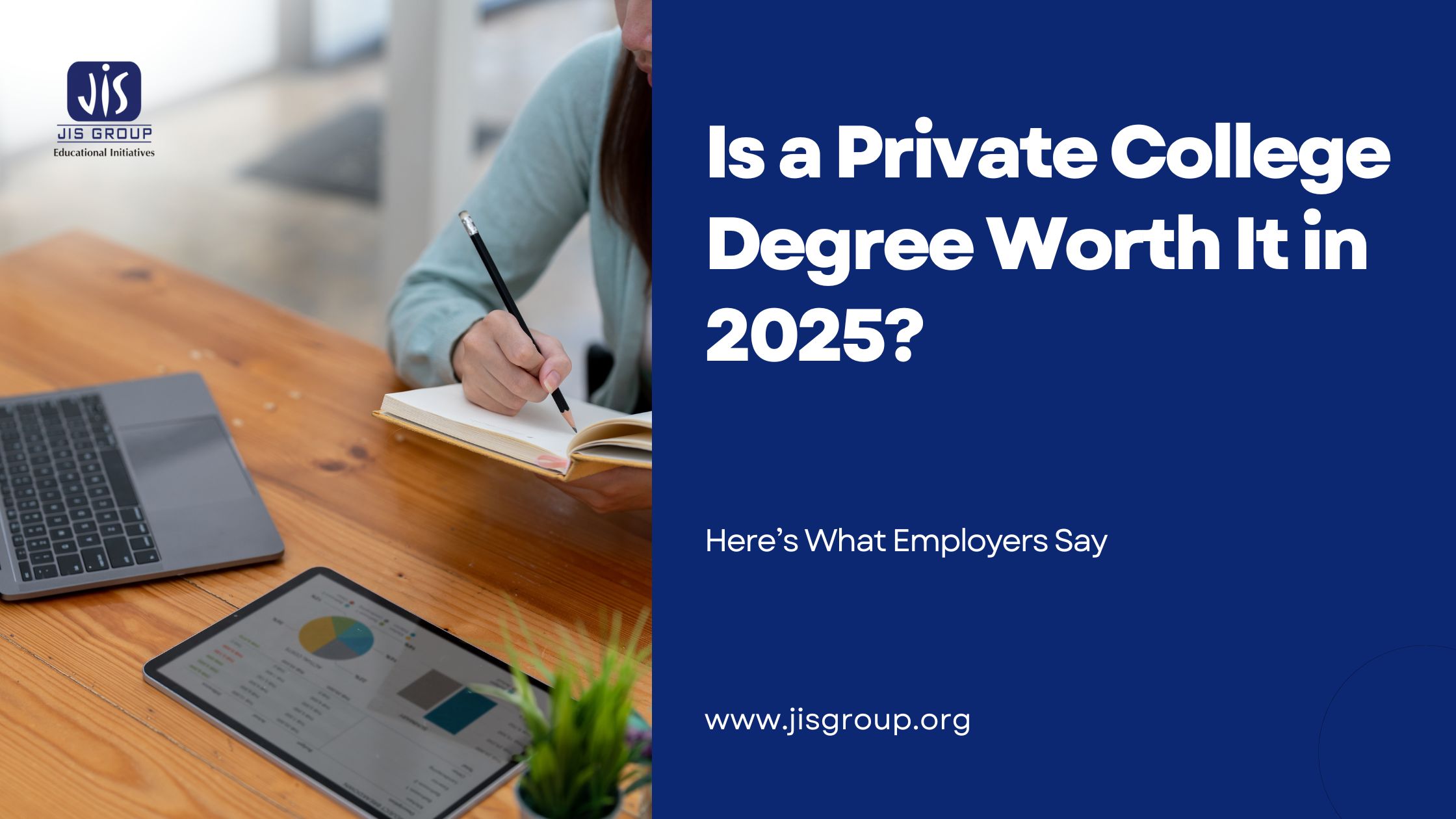The most persistent question students ask in 2025 is not what to study but where—and whether a private college degree meaningfully changes their career trajectory. Employers, who ultimately arbitrate the value of a credential, are clear on two things: skills and signals. A degree from a private institution can deliver both—if the college couples academic rigor with industry immersion.
The Employability Gap in India
First, the macro picture. India’s graduate employability remains uneven. Mercer | Mettl’s Graduate Skill Index 2025—drawing on data from 2,700 campuses and over one million learners—reports overall employability at 42.6%, with sharper gaps in some non-technical roles. At the same time, technical readiness in domains like AI/ML is rising, reflecting a decisive shift in what employers reward. The India Skills Report 2025 echoes this pivot: employers increasingly privilege demonstrable skills, certifications, and project portfolios—particularly in data, cloud, and advanced manufacturing—over seat time.
Employers Want Skills, Not Just Degrees
Second, hiring demand is no longer monolithic. Traditional IT services recruitment has stayed subdued for six to seven quarters, but AI and cloud skills are flourishing across non-IT sectors—from BFSI and healthcare to logistics and retail—where digital transformation budgets are expanding. Semiconductor design roles tell a nuanced story: headline openings dipped in FY24-25, yet niche skills in VLSI, embedded systems, and analog design are in high demand, buoyed by national capacity-building programs. The employer message is unambiguous: if your college builds pipelines into these skill clusters, your degree commands a premium.
Placement Outcomes from Private Colleges
Consider recent outcomes among NIRF-listed private institutions: median salaries reported for 2022-23 range from ₹10 LPA at RVCE to ₹19 LPA at BITS Pilani, and ₹30.3 LPA at IIIT-Hyderabad, alongside strong placement rates. While these figures vary by program, they illustrate how industry-aligned curricula translate into market value. Of course, raw numbers don’t tell the whole story: employers scrutinize capstone projects, internships, hackathon wins, and published work—signals that the classroom has been stress-tested in real contexts.
What Makes the Best Private Colleges Stand Out
What differentiates the best private colleges in 2025, in the eyes of recruiters, is a design philosophy: build the curriculum around problems rather than chapters. That means outcome-based syllabi, live industry briefs, practitioner-taught electives, and labs that mirror production environments (DevOps pipelines, clean rooms, sim labs, moot courts, hotel ops floors—depending on the discipline). Institutions that pair this with robust career services—targeted pre-placement training, LinkedIn/portfolio clinics, and alumni-mentor networks—consistently deliver stronger employer satisfaction and, ultimately, better offers.
The Role of JIS Group in Shaping Talent
In Eastern India, one ecosystem to watch is the JIS Group of Educational Initiatives, which brings under one umbrella a spread of programs that map closely to talent shortages employers report. Across its institutions and JIS University in Kolkata, offerings span engineering, management, pharmacy, law, hotel/hospitality management, and allied health sciences—domains where workforce demand and regulatory rigor both run high. For students, that breadth matters: cross-disciplinary minors (say, management for engineers or data analytics for pharmacists) are increasingly prized by recruiters building agile teams.
The Learn-to-Earn Continuum
Equally important in 2025 is the learn-to-earn continuum. TeamLease Edtech’s recent analysis shows fewer than one in four employers fully sponsor upskilling—so graduates who enter the market already conversant with industry tools (Git, Kubernetes, Tableau/Power BI, LabVIEW, MATLAB/Simulink, EDA suites, legal research databases, PMS software in hospitality) are less dependent on corporate training cycles and ramp faster on projects. Private colleges that integrate these stacks into credit-bearing coursework—rather than relegating them to optional workshops—earn explicit praise from hiring managers.
Choosing the Right Private College: Four Employer-Centric Criteria
So, is a private college degree worth it? In 2025, the answer is yes—conditionally. Choose institutions that:
-
Prove placement depth, not just peak packages. Ask for median CTCs by program and the distribution of roles (core vs. peripheral). The best career cells publish multi-year trendbooks and recruiter rosters. Benchmarks from top private colleges suggest what good looks like; use them to calibrate expectations for your discipline.
-
Hard-wire industry immersion. Prioritize programs with mandatory internships, co-ops, or apprenticeship credits; embedded certifications (AWS, Azure, Google Cloud; SAP; Cisco/Red Hat); and live case partnerships with GCCs and MSMEs. Current hiring dynamics reward exactly these exposures.
-
Invest in scarce skills. If you’re eyeing electronics, ensure exposure to VLSI, embedded C/C++, verification, and EDA tools; for CS/IT, insist on production-grade ML, MLOps, and security; for management, analytics and fintech labs; for pharmacy and allied health, compliant labs and clinical rotations; for law, robust legal aid clinics and moot teams. These are the pockets employers flag as hiring priorities despite cyclical slowdowns.
-
Enable interdisciplinary pathways. The strongest private ecosystems—like those under the JIS Group —allow students to stack minors/certifications across engineering, management, life sciences, law, and hospitality, widening their surface area for recruiters across sectors in Kolkata and beyond.
Looking Ahead: Skills as the New Currency
If you are targeting Kolkata, look for signals associated with the Best private college in Kolkata for your field: credible accreditation, research output, industry labs, and transparent private college placements data. Public rankings and aggregation platforms can help you shortlist, but always corroborate on the institution’s official site and speak with recent alumni. Ultimately, employers in 2025 are less enamored with labels and more persuaded by readiness. A private college degree becomes a high-leverage asset when it is a scaffold for employable skills, a port of entry to real projects, and a platform for continuous upskilling—all of which the stronger private institutions demonstrably provide. Choose with discernment, and your degree will signal exactly what employers want to see: mastery, momentum, and the motivation to keep learning.
